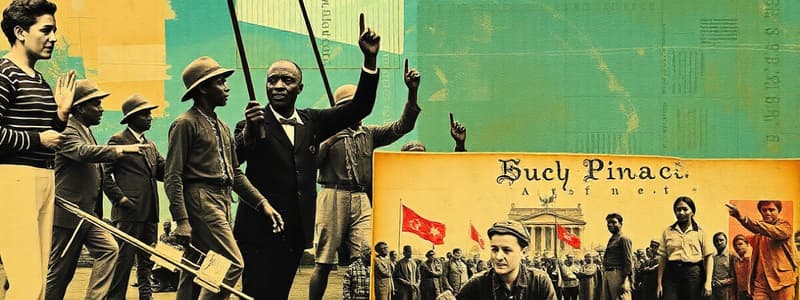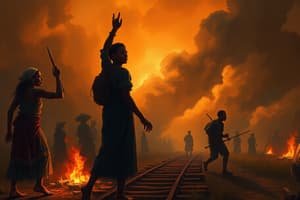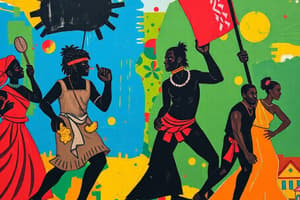Podcast
Questions and Answers
What is Patrick Rael's primary focus in his work regarding emancipation?
What is Patrick Rael's primary focus in his work regarding emancipation?
- The economic impact of slavery on the United States
- The legislative measures taken to end slavery
- The experiences of freed slaves after emancipation
- The role of black agency and resistance to slavery (correct)
According to Rael, what aspect complicates the narrative of emancipation in the United States?
According to Rael, what aspect complicates the narrative of emancipation in the United States?
- The influence of the labor economy on emancipation
- The unique political power of the 'slave power' (correct)
- The effectiveness of self-emancipation
- The dual political systems that existed
What critique does Allen Guelzo have regarding Rael's thesis on emancipation?
What critique does Allen Guelzo have regarding Rael's thesis on emancipation?
- It oversimplifies the roles in achieving emancipation. (correct)
- It downplays the importance of war in emancipation.
- It lacks historical context about the Atlantic world.
- It focuses too heavily on political systems.
What approach does Rael take to understand the relationship between black resistance and emancipation?
What approach does Rael take to understand the relationship between black resistance and emancipation?
Which statement best describes the political situation in the U.S. regarding slavery, as presented by Rael?
Which statement best describes the political situation in the U.S. regarding slavery, as presented by Rael?
Flashcards
Self-emancipation thesis
Self-emancipation thesis
The idea that enslaved people were primarily responsible for their own liberation.
Black agency
Black agency
The capacity of people of African descent to act independently and make choices.
Emancipation in the US
Emancipation in the US
The process of ending slavery in the United States.
"Slave power"
"Slave power"
Signup and view all the flashcards
Extra-political means
Extra-political means
Signup and view all the flashcards
Study Notes
Emancipation and the Role of Slave Resistance
-
Patrick Rael's book, "Eighty-Eight Years," argues that US emancipation was unique, requiring the fracturing of the political system and war due to the coexistence of slave power and a free labor economy within a democratic political system resistant to addressing slavery.
-
Rael emphasizes the role of slave resistance, arguing that the enslaved's actions—resistance, flight, and discontent—were crucial ammunition for abolitionists and influenced public opinion, highlighting the inhumane nature of slavery.
-
Rael contends that the enslaved's actions were critical in sensitizing an otherwise indifferent public to slavery's impact on free society, especially through the "slave power" argument, and cases like fugitive slaves.
-
Rael stresses that slave resistance, while critical, was not solely responsible for emancipation; other factors including abolitionists' arguments and political maneuvering also played a role.
-
Rael disputes Guelzo's view that emancipation was triggered by the Emancipation Proclamation, arguing that slave flight and resistance significantly influenced the Union's policies.
Guelzo's Counterarguments
-
Guelzo questions the "self-emancipation thesis," criticizing its vagueness and perceived Marxist romanticism, emphasizing distinct roles of slavery and emancipation.
-
Guelzo differentiates between different forms of "freedom" (spiritual, de facto, and legal) and argues that true emancipation demands dismantling the legal structure of slavery.
-
Guelzo argues that slaves lacked direct political power to affect their legal status during emancipation, asserting that their influence was, in fact, limited.
-
Guelzo contrasts the impact of slave flight on public opinion to that on legal status, suggesting that while flight may have affected public opinion, its impact on legal changes was minimal.
-
Guelzo criticizes Rael's assertion of "voluminous evidence" supporting slave resistance influencing Union policy, arguing that much of this evidence involved efforts to return escaped slaves and was not directly linked to emancipation initiatives.
-
Guelzo posits that the Union's indifference to racial equality was a key factor in the lack of progress for freedpeople during Reconstruction.
-
Guelzo asserts that the forces that drove Reconstruction did not stem from capitalist principles, but instead the refusal to embrace them.
Studying That Suits You
Use AI to generate personalized quizzes and flashcards to suit your learning preferences.
Description
Explore Patrick Rael's arguments from 'Eighty-Eight Years' regarding the unique aspects of US emancipation. This quiz focuses on the role of slave resistance and its impact on abolitionist movements and public opinion. Understand how these factors intertwined with political dynamics to influence the course of history.




